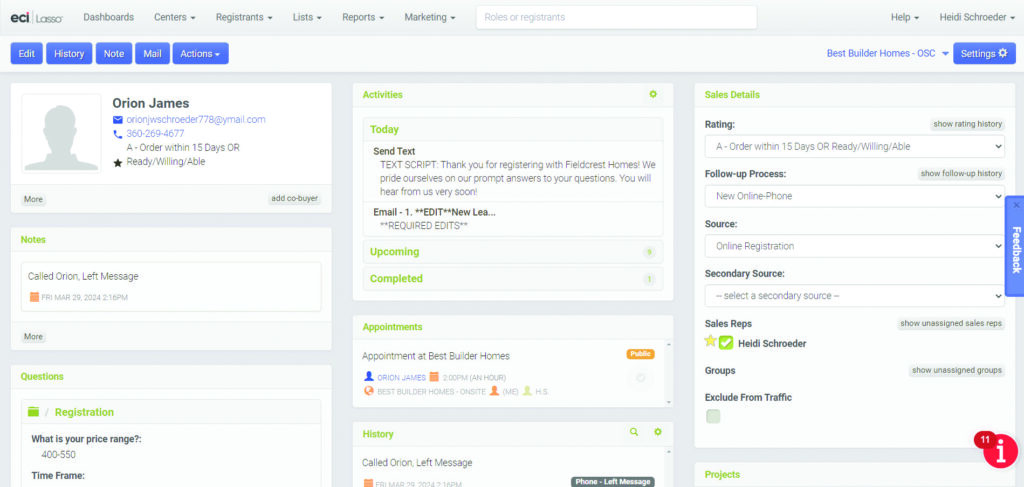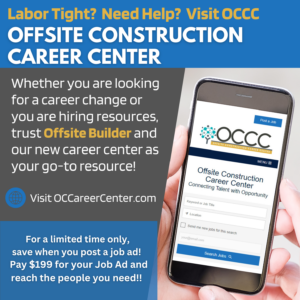Modular manufacturers and builders have been slow to adopt this technology, but there are now programs targeted specifically to their needs.
- Customer Relationship Management (CRM) systems can guide prospects through the homebuying process, helping them to make better decisions, and facilitating closer working relationships with the salesperson.
- Industry-specific CRM programs help salespeople connect with each customer at the right times and offer targeted messaging that’s tailored to each customer’s place in the homebuying process.
- These programs take effort to learn, and success requires a commitment from management and salespeople. However, they ultimately save time and effort for everyone.
Customer Relationship Management (CRM) systems are now ubiquitous across all industries. The first CRM program, ACT, became available in the 1980s and still exists, but the big names today are Salesforce, HubSpot and Zoho. These companies’ products can adapt to most any industry sector.
Offsite builders and housing manufacturers have been slow to adopt this technology. Fortunately, however, industry-specific CRM programs have become available.
In this article we examine how CRM earns its keep in modular sales, and look at two industry-specific programs — MhCRM and Lasso. These programs were built with the homebuying process in mind, and offer the ability to create custom messaging for each step in that process.

Photo courtesy of ECI Software Solutions
What is a CRM system?
A CRM system is “technology for managing all your company’s relationships and interactions with customers and potential customers,” according to the Salesforce website.
MoJo Active, a 40-person marketing agency based in Watsontown, Pa., has set up many companies with CRMs and is a HubSpot provider. MoJo Active Co-Owner Jared Frank has a career in digital marketing that spans 17 years and has seen CRMs evolve from a simple database technology to one with more functionality, segmentation and flexibility.
CRMs have “shifted and expanded to help people in their buying decisions,” Frank says. Moreover, they can be tailored to help people early in their decision-making process and can deliver messaging according to buyers’ personal preferences, and where they are in the sales process.
These messages tend to be more informational than sales oriented. For instance, a new prospect may get basic information about home styles or the building process, with links to an FAQ page. Someone farther down the sales funnel may receive messages about optional amenities, colors and finishes.
Frank suggests thinking of a CRM as a tool that increases efficiency and augments the personal relationships salespeople have with customers. “The salesperson can set reminders to him or herself to touch base and reach out personally to the customer [at specific times].”

Photo courtesy of ECI Software Solutions
Targeting Modular
One CRM especially designed for both modular builders and manufactured home retail sales is MhCRM, which is based in Irvine, California and was developed in 2020, with new updates occurring quarterly.
MhCRM’s workflows mirror the homebuilding process and can integrate seamlessly with other programs. It also promotes homeowner satisfaction by prompting after-sale follow-up.
Scott Stroud is a building systems veteran and the company’s Director of Development. In Stroud’s view, only two people should be involved in a CRM, the salesperson and the customer. “The CRM needs to be easy to use for the salesperson, and it must deliver a good experience for the customer,” he says.
Although Stroud recognizes the challenge in getting modular builders to put this technology to best use, he also knows it’s an uphill battle in all industries. CIO magazine estimates that about one-third of all CRM efforts fail, but Stroud thinks it’s closer to 75% globally.
With a variety of products on the market, choosing the right CRM is important. Misalignment can happen if a CRM isn’t scalable and does not fit the size or needs of a company. However, he says that technology choices aren’t usually the main reason CRM implementations don’t succeed. The main reason is people. Specifics include:
- Vague goals and objectives for the CRM
- A misunderstanding of the user experience
- Making a financial investment without adequate planning or without sufficient staff buy-in
- Lack of collaboration between the company’s sales and marketing departments
- Lack of oversight by management
- Inadequate training
- Lack of consistency: use of the CRM sporadically, or not at all
- Inadequate workflow process discipline
To avoid these problems, Stroud spends time personally onboarding and training new builder customers, and doing the requested customization. “The user is in total control and no automation will take place without them initiating it,” he says.
Of course, the company’s salespeople need to have a willingness to learn if the effort is to succeed.

Photo courtesy of MHCRM
Getting Up to Speed
Frank points out that there are measurable rewards for those who are willing to learn. When pitching CRMs to clients, Stroud devised the acronym for SYSTEMS for CRMs: Save Your Self Time Energy and Money.
Ultimately, A CRM “takes work off your plate,” he says. This is as true for sales managers as for salespeople because it gives managers faster visibility on actionable items such as when a contract is signed or a deposit is made. CRMs can also help the sales manager forecast sales more accurately with better and more timely information.
With the current state of automation, less time than ever needs to be spent on data entry, since CRMs can directly integrate with all forms of communication, including emails and texts.
Timberhaven Log Homes, a manufacturer based in Middleburg, Pa., had been looking for a replacement for their old CRM system. Their main objective was to gain automation in lead assignments. The goals included less manual entry, mobile-friendly communications, the ability to initiate robust drip email campaigns, and a concise dashboard with better tracking and reporting tools.
Bobbi Landis, Timberhaven’s Marketing Director, says the team researched several alternatives, including Salesforce, another program designed for the building industry, and a custom-built program. However, each was either unaffordable or unable to meet their needs. They eventually opted for MhCRM.
Timberhaven’s new MhCRM system has taken some getting used to, Landis says, noting that there has been a learning curve because it’s more sophisticated than their former system. She says that the after-sale service that her MhCRM rep provides has been essential. “I reach out to him quite frequently,” Landis says.

Photo courtesy of MoJo Active
Simplifying Processes
Another industry-specific CRM is Lasso from ECI Solutions, a Netherlands-based company. It’s one of the oldest CRMs that caters to homebuilders, real estate developers, new home agencies and manufactured home dealerships and communities. Lasso was founded in 2002 in Vancouver, Canada and was originally developed for commercial building.
Heidi Schroeder, Senior Consultant at ECI, primarily serves Lasso CRM clients. Her experience with CRMs goes back to the 1990s when the first generation of ACT was implemented. Since that time, Schroeder has worked with Salesforce and HubSpot, and now her role is to help builders learn and adopt their CRM so they can manage their business efficiently and effectively.
“I help sales and marketing teams to understand their role in their company’s growth and to adopt and embrace technology,” Schroeder says.
Schroeder has an interesting perspective as she has seen the business from both sides. She was an online sales consultant for a builder, where she quickly established herself as the de-facto CRM expert, having helped the builder employ the Lasso system.
Schroeder says she helps builders who are new to CRMs as well as those who are migrating away from other CRM systems to Lasso. Salespeople often come to her expecting “a lot of pain,” she says, because they believe CRMs will be burdensome for their team to use.
“Builders are fearful that they are going to invest the time to implement a new system and it isn’t going to work for them,” Schroeder says. “They’ve sometimes been burned by using other CRMs ineffectively. Time is money in the building world.”
To confront this notion Schroeder emphasizes the simplicity of Lasso’s CRM and “how we can make their life easier,” she says.
With Lasso, as with any good CRM, workflows can be scheduled to make sales follow-up easy, and there are triggers to ensure leads get followed up on, she says. There are automation features that allow marketers to schedule email campaigns based on a customer’s particular interest and level of engagement. For example, the customer may be in the tire-kicking phase. In this phase you may need to spur interest by giving them basic information about pricing and housing options to gain interest and advance the process.
Salespeople are also able to qualify and disqualify leads, while keeping in contact with customers who are qualified “not ready to buy immediately.”

Photo courtesy of MoJo Active
Organizing Processes
Kevin Satterthwaite, a modular builder in Vandalia, Illinois, is a longtime proponent of using CRMs and currently uses MhCRM. Satterthwaite started with ACT in 2005 before he moved to a manufacturer’s proprietary CRM, and a further two systems that had increasing levels of automation and industry specialization.
He was always looking for easier to use systems for his salespeople as well as one that specifically catered to him as a homebuilder.
“I’m not a tech person,” he says, but added he sees CRMs as a more efficient and better way to manage his business. “CRMs make my salespeople more organized,” he says. There are “fewer slips through the cracks because with my CRM I have a documented history with every single contact made. It is a lot easier to manage than a stack of file cabinets.”
He says that with MhCRM’s system, outgoing emails from salespeople to customers go directly into his system along with the customers’. This allows for a permanent record of interactions and provides a linear process for the sale to go to the next step.
Additionally, the salesperson can log notes and task reminders, integrate and combine successful messaging into flyers and campaigns, and personalize messages, whether sending something to two people or to the entire database.
Currently, Satterthwaite has CRM-based email campaigns that he’s sending to segments of his database, which are graded according to readiness to purchase. Messages are carefully worded and sent to leads based on prescribed timelines.
Overall, Stroud says there’s not a downside to CRMs, and that builders who embrace the technology will become more efficient and better at sales. “It is time to put the relics of the Franklin Planner and the Rolodex behind us,” he says. “CRMs have been around for more than 30 years, and they just keep getting better with increased automation and specialization.”

Photo courtesy of MoJo Active
Reed Dillon is a content brand specialist, marketing consultant and freelance writer that focusses on offsite and new construction. He is the owner of Creative Brand Content in Moneta, Virginia. Contact: [email protected]







